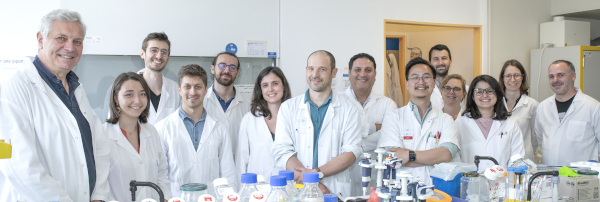
 Team leaders : Prof. Olivier Benveniste & Dr Yves Allenbach
Team leaders : Prof. Olivier Benveniste & Dr Yves Allenbach
The team lead by Prof. Olivier Benveniste is committed to perform translational medicine studies focused on muscle immunology (primary inflammatory myopathies or myositis).
Myositis projects
Auto-immune myopathies are a rare and heterogeneous acquired muscle diseases since both muscular and extra-muscular manifestations may differ, leading to identify subgroups of patients based on clinical phenotype and muscle pathology. Life-threatening complications still exist. The pathophysiology of these disabling diseases remains largely unknown. To date, most of these auto-immune myopathies are associated with newly described myositis specific auto-antibodies (MSA). Whereas each MSA is associated with a relatively homogenous clinical phenotype, nothing is known concerning the specificity of muscle pathology associated with a given MSA. In addition, the specificity of muscular immune response associated with a given MSA is not described as well.
Our goal is to revisit the classification, physiopathology and then treatment of the different inflammatory myopathies based on their MSA.
To achieve this goal and since the opening of the team, we have setting-up an e-CRF for myositis. We established the ethical management rules and obtained approval from ethical committee and CCTIRS. We launched this e-CRF in our center but also in 8 other centers in France. We started to perform patient characterization and phenotyping (998 patients are in the database in April 2015, and for 230 of them we already completed clinical/biological notably serological/imaging/pathology parameters). We hired a PhD student with a project in epidemiology to feed and analyse this database. In parallel, we established sample banking in “Myosites ADN-ARNthèque Serothèque Cellulothèque” (MASC study) (reference Codecoh: DC-2011-1445). Using these tools, we sharply characterize inflammatory responses of patients, effects of MSA on myoblasts primary cultures / tubes, or in vivo on mouse.

Team members
Olivier Benveniste, PU-PH, Co-team leader, Head of the Department of Internal Medicine et Clinical Immunology, Myositis National Network Coordinator
Yves Allenbach, PU-PH, Co-team leader
Sarah Léonard-Louis, PH
Damien Amelin, Research Assistant
Linda Chenane, PhD student
Julian Sanchez – Dal Cin, Post-doctorant
Bérénice Tendrel, Research Assistant
Sami Tayb Boulahfa, PhD student
Batoul Rostom, PhD student
Litan Wang, Research Assistant
Joe Elie Salem, PU PH
Marie Bretagne, PhD student
Ana Ferreiro, Research Director
Andrew Ho, Research Project Manager
Last publications
- Charlotte Fenioux, Baptiste Abbar, Samia Boussouar, Marie Bretagne, John Power, et al.. Publisher Correction: Thymus alterations and susceptibility to immune checkpoint inhibitor myocarditis. Nature Medicine, 2024, ⟨10.1038/s41591-023-02771-0⟩. ⟨hal-04414859⟩
- Charlotte Fenioux, Baptiste Abbar, Samia Boussouar, Marie Bretagne, John Power, et al.. Thymus alterations and susceptibility to immune checkpoint inhibitor myocarditis. Nature Medicine, 2023, 29 (12), pp.3100-3110. ⟨10.1038/s41591-023-02591-2⟩. ⟨hal-04510220⟩
- Luce Barbat Du Closel, Nathalie Bonello-Palot, Yann Pereon, Andoni Echaniz-Laguna, Jean Philippe Camdessanche, et al.. Clinical and electrophysiological characteristics of women with X-linked Charcot-Marie-Tooth disease. European Journal of Neurology, 2023, 30 (10), pp.3265-3276. ⟨10.1111/ene.15937⟩. ⟨hal-04254200⟩
- Tanya Stojkovic, Marion Masingue, Helène Turmel, Marianne Hezode-Arzel, Anthony Béhin, et al.. Diagnostic yield of a practical electrodiagnostic protocol discriminating between different congenital myasthenic syndromes. Neuromuscular Disorders, 2022, 32 (11-12), pp.870-878. ⟨10.1016/j.nmd.2022.10.001⟩. ⟨hal-04074000⟩
- Océane Landon-Cardinal, Perrine Guillaume-Jugnot, Ségolène Toquet, Nabiha Sbeih, Aude Rigolet, et al.. JAK inhibitors for the treatment of adult dermatomyositis: A pilot study. Journal of The American Academy of Dermatology, 2022, ⟨10.1016/j.jaad.2022.10.055⟩. ⟨hal-03996988⟩
- Alexandrine Mahoudeau, Céline Anquetil, Nozomu Tawara, Hossein Khademian, Damien Amelin, et al.. Myostatin in idiopathic inflammatory myopathies: Serum assessment and disease activity. Neuropathology and Applied Neurobiology, 2022, ⟨10.1111/nan.12849⟩. ⟨hal-03830849⟩
- Debora Pehl, Corinna Preuße, Yves Allenbach, Olivier Benveniste, Philipp Dittert, et al.. Eosinophilic fasciitis (Shulman syndrome)—recognition of the histological spectrum allows for new insights into possible pathomechanisms. Rheumatology, 2022, ⟨10.1093/rheumatology/keac526⟩. ⟨hal-03830836⟩
- Paul Breillat, Kuberaka Mariampillai, Paul Legendre, Pauline Martins, Bertrand Dunogue, et al.. Anti-PM-Scl antibodies–positive patients encompass three different groups with distinct prognoses. Rheumatology, 2022, ⟨10.1093/rheumatology/keac508⟩. ⟨hal-03830880⟩
- Sarah Julien, Douangsone Vadysirisack, Camil Sayegh, Sharan Ragunathan, Yalan Tang, et al.. Prevention of Anti-HMGCR Immune-Mediated Necrotising Myopathy by C5 Complement Inhibition in a Humanised Mouse Model. Biomedicines, 2022, 10 (8), pp.2036. ⟨10.3390/biomedicines10082036⟩. ⟨hal-03830885⟩
- Corinna Preuße, Barbara Paesler, Christopher Nelke, Derya Cengiz, Thomas Müntefering, et al.. Skeletal muscle provides the immunological micro-milieu for specific plasma cells in anti-synthetase syndrome-associated myositis. Acta Neuropathologica, 2022, 144 (2), pp.353-372. ⟨10.1007/s00401-022-02438-z⟩. ⟨hal-03830925⟩
- Antoine Soulages, Thierry Maisonobe, Pascal Auzou, Antoine Petit, Yves Allenbach, et al.. Peripheral neuropathy and livedoid vasculopathy. Journal of Neurology, 2022, 269 (7), pp.3779-3788. ⟨10.1007/s00415-022-11007-z⟩. ⟨hal-03832490⟩

